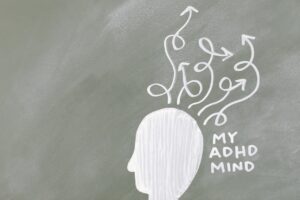I wasn’t diagnosed with ADHD until my late 40’s. Up until that point, I’d always just thought I was easily distracted, had severe time blindness and was a big-time procrastinator. It wasn’t until I got a brain scan from the Amen clinic, and fully understood my particular type of ADHD, that I learned why I operated the way I did. My hyperfocus about things I cared about (and putting off the things I didn’t), lateness and inability to focus on just one thing at a time finally made sense. So, like all things when it comes to my health, I dove in and researched ADHD medications, methods to cope and also ways in which to view my diagnosis as a superpower.

I describe ADHD a lot on my social media, in these blogs and on my podcast. I do this because people who have it immediately click with me, and–hopefully–adopt some of the strategies I use to keep me more focused and productive. It also helps all the neurotypical people around me understand why I operate the way I do. This helps them know how to communicate with me and handle some of the things they probably find super annoying, until they understand the reasons my brain works the way it does.
One of the ways I’ve managed to harness and use my ADHD to my advantage is by taking the right medication. There are several out there that work, but it’s important to know that what works for one person, or for a child, might not work for you. I sat down with Dr. Craig Heacock, a physician, psychotherapist expert in ADHD medications, to uncover the best ones, including dosages, for adults.

What is ADHD?
Attention-deficit/hyperactivity disorder (ADHD) is a neurological condition that affects millions of people worldwide. Characterized by symptoms such as inattention, hyperactivity, and impulsivity, it makes it difficult to perform daily tasks and maintain relationships. Fortunately, there are several medications available that help manage ADHD symptoms in adults.
The Best ADHD Medications for Adults
Dr. Craig Heacock recommends the following medications as some of the best options for treating adult ADHD.
-
Stimulant medications
Stimulant medications are some of the most commonly prescribed drugs for ADHD. They work by increasing the levels of dopamine and norepinephrine in the brain, which can improve attention, focus, and impulse control. Dr. Heacock recommends two types of stimulant medications for adult ADHD: methylphenidate and amphetamines.
Methylphenidate, also known as Ritalin or Concerta, is a stimulant medication that has been used for ADHD treatment for over 50 years. It comes in several forms, including immediate-release and extended-release tablets, taken once or twice daily. Methylphenidate is generally well-tolerated and has few side effects, but it may cause insomnia or decreased appetite in some people.
Amphetamines, such as Adderall and Vyvanse, are also effective stimulant medications for ADHD. They work similarly to methylphenidate but are longer-lasting and have a slightly different mechanism of action. Amphetamines are usually taken once daily and can provide symptom relief for up to 12 hours. Common side effects of amphetamines include decreased appetite, insomnia, and irritability.
-
Non-stimulant medications
While stimulant medications are effective for most people with ADHD, they may not be suitable for everyone. Some people may experience side effects or have a history of substance abuse, which can make stimulant medications risky. In these cases, non-stimulant medications may be a better option.
Dr. Heacock recommends two non-stimulant medications for adult ADHD: atomoxetine and guanfacine.
Atomoxetine, also known as Strattera, is a selective norepinephrine reuptake inhibitor (SNRI) that can improve attention and reduce impulsivity. Taken once or twice daily, it takes several weeks to reach its full effect. Common side effects include nausea and dry mouth. (He has a lot more to say and has some interesting opinions on Strattera, so be sure to listen to the podcast linked below for all the deets).

The Best Course of Action
The best medication comes down to what works best for you, usually by some trial and error and good communication with your prescribing doctor. It’s also incredibly helpful to get a good diagnosis since there are several different types of ADHD. I highly recommend getting a brain scan by a doctor like Dr. Amen, a world-renowned brain specialist, to determine the best protocol based on your individual results.
Dr. Heacock notes that sometimes it’s the amount of medication being prescribed that misses the mark. Too much, for example, can cause sleeplessness, which brings on fatigue, which is then misinterpreted as being unfocused or distracted. That’s why working closely with a physician is imperative.
Check out the podcast I did about ADHD medications here.
Click For More Dr. Amen Podcasts:
Treating Adult ADHD With Dr. Amen
How to Cure Adult ADD With Dr. Amen
Anxiety and Depression With Dr. Amen
Oh, and did you know I have a Patreon? If you love my free episodes, you’re going to LOVE the extra ones that I reserve just for my homies. These episodes are juicer, more personal, feature my husband Bret completely unfiltered and are kinda like a secret club. Check it out here.


